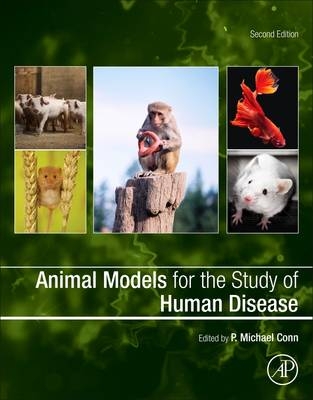
Animal Models for the Study of Human Disease
Academic Press Inc (Verlag)
978-0-12-809468-6 (ISBN)
Offering easily searchable advantages and disadvantages for each animal model and organized by disease topics, this resource aids researchers in finding the best animal model for research in human disease.
P. Michael Conn is the Senior Vice President for Research and Associate Provost, Texas Tech Health Sciences Center. He is The Robert C. Kimbrough, Professor of Internal Medicine and Cell Biology/Biochemistry. He was previously Director of Research Advocacy and Professor of Physiology and Pharmacology, Cell Biology and Development and Obstetrics and Gynecology at Oregon Health and Science University and Senior Scientist of the Oregon National Primate Research Center (ONPRC). He served for twelve years as Special Assistant to the President and Associate Director of the ONPRC. After receiving a B.S. degree and teaching certification from the University of Michigan (1971), a M.S. from North Carolina State University (1973), and a Ph.D. degree from Baylor College of Medicine (1976), Conn did a fellowship at the NIH, then joined the faculty in the Department of Pharmacology, Duke University Medical Center where he was promoted to Associate Professor in 1982. In 1984, he became Professor and Head of Pharmacology at the University of Iowa College of Medicine, a position he held for eleven years. Conn is known for his research in the area of the cellular and molecular basis of action of gonadotropin releasing hormone action in the pituitary and therapeutic approaches that restore misfolded proteins to function. His work has led to drugs that have benefitted humans and animals. Most recently, he has identified a new class of drugs, pharmacoperones, which act by regulating the intracellular trafficking of receptors, enzymes and ion channels. He has authored or co-authored over 350 publications in this area and written or edited over 200 books, including texts in neurosciences, molecular biology and endocrinology. Conn has served as the editor of many professional journals and book series (Endocrinology, Journal of Clinical Endocrinology and Metabolism, Endocrine, Methods, Progress in Molecular Biology and Translational Science and Contemporary Endocrinology). Conn served on the National Board of Medical Examiners, including two years as chairman of the reproduction and endocrinology committee. The work of his laboratory has been recognized with a MERIT award from the NIH, the J.J. Abel Award of the American Society for Pharmacology and Experimental Therapeutics, the Weitzman, Oppenheimer and Ingbar Awards of the Endocrine Society, the National Science Medal of Mexico (the Miguel Aleman Prize) and the Stevenson Award of Canada. He is the recipient of the Oregon State Award for Discovery, the Media Award of the American College of Neuropsychopharmacology and was named a distinguished Alumnus of Baylor College of Medicine in 2012. Conn is a previous member of Council for the American Society for Cell Biology and the Endocrine Society and is a prior President of the Endocrine Society, during which time he founded the Hormone Foundation and worked with political leadership to heighten the public’s awareness of diabetes. Conn’s students and fellows have gone on to become leaders in industry and academia. He is an elected member of the Mexican Institute of Medicine and a fellow of the American Association for the Advancement of Science. He is the co-author of The Animal Research War (2008) and many articles for the public and academic community on the value of animal research and the dangers posed by animal extremism. His op/eds have appeared in The Washington Post, The LA Times, The Wall Street Journal, the Des Moines Register, and elsewhere. Conn consults with organizations that are influenced by animal extremism and with universities and companies facing challenges from these groups.
1. Ethics and animal research: Foundations, basic principles, applications for animal models of human disease 2. Psychological enrichment of animals in research 3. Large Animal Models 4. Animal models of cataracts 5. Animal models for retinitis pigmentosa 6. Animal Models for Atherosclerosis and myocardial infarction 7. Animal Models for cardiovascular research 8. Animal models of cardiac disease 9. Animal models of metabolic syndrome 10. Animal Models of Diabetes 11. Animal models of obesity 12. Models for the manipulation of energy expenditure 13. Animal models for liver diseases 14. Animal Models of Skin Regeneration 15. Animal models of skin disorders 16. Models of Chronic Kidney Disease 17. Animal Models of Urinary Stone Disease 18. Animals models for for healing studies after partial nephrectomy 19. Animal models of IBD 20. Animal models of stroke 21. Zebrafish models of olfactory and neuromuscular dysfunction of degeneration 22. Animal models of drug abuse 23. Animal models of schizophrenia 24. Animal models for the exploration of Klinefelter's syndrome 25. The Use of Zebrafish in Medical Genomics 26. Transgenic pigs as models for translational biomedical research 27. Genetically modified animal models 28. Mouse model of human disease by forward and reverse genetics 29. Animal models of neonatal seizures 30. Animal Models for the Study of Infection-Associated Preterm Birth 31. Animal models for the study of neonatal disease 32. Animal models of fetal programming 33. Animal models of human viral diseases 34. CRISPR Models of Cancer 35. Animal models of breast cancer 36. Animal models of systemic sclerosis: past, present, and perspective 37. Animal models of multiple sclerosis 38. Animal Models of Mood Disorders 39. Pigs in Behaviour Models 40. Models of Alzheimer's disease 41. MPTP-induced animal models for Parkinson's disease 42. Animal Models of Neurodegenerative Disease 43. Animal models of mania 44. Animal Models of Stress Coping and Resilience
| Erscheinungsdatum | 12.07.2017 |
|---|---|
| Verlagsort | San Diego |
| Sprache | englisch |
| Maße | 216 x 276 mm |
| Gewicht | 3420 g |
| Themenwelt | Medizin / Pharmazie ► Medizinische Fachgebiete |
| Naturwissenschaften ► Biologie ► Zoologie | |
| Veterinärmedizin ► Klinische Fächer ► Versuchstiere | |
| ISBN-10 | 0-12-809468-0 / 0128094680 |
| ISBN-13 | 978-0-12-809468-6 / 9780128094686 |
| Zustand | Neuware |
| Haben Sie eine Frage zum Produkt? |
aus dem Bereich


